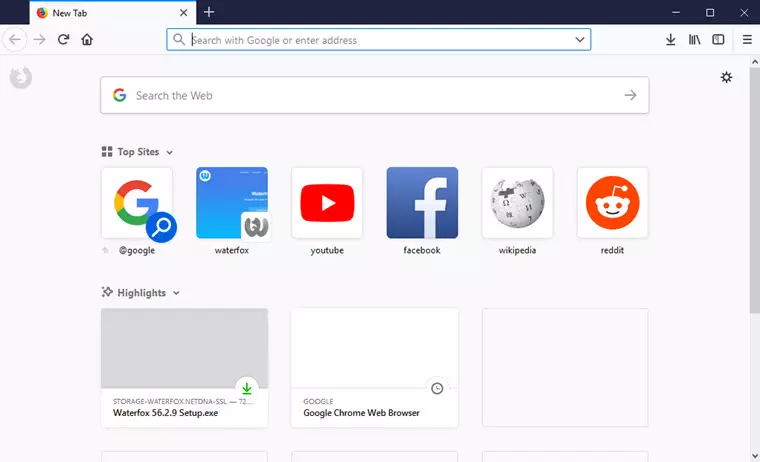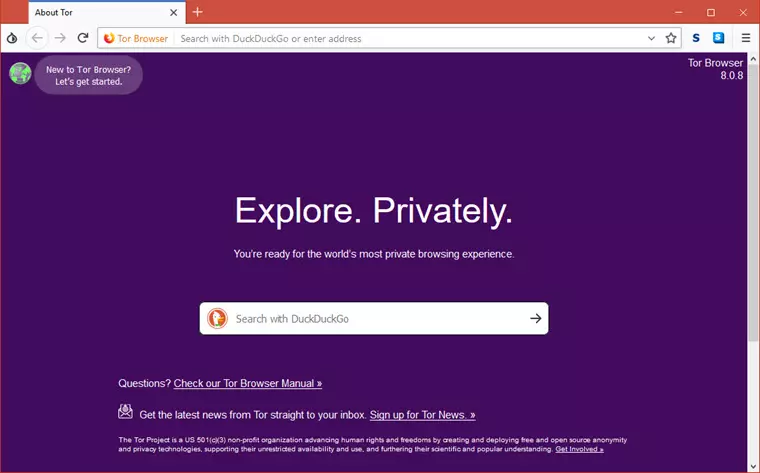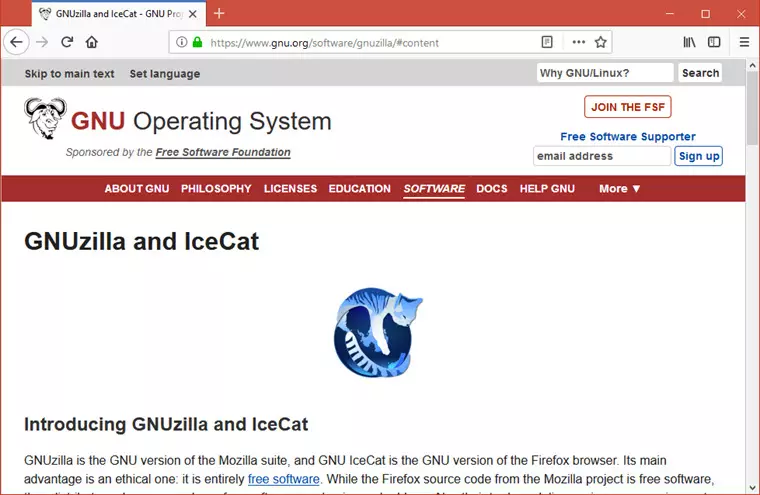Data collection and tracking have become a digital epidemic over the past decade, as user information has become the largest commodity in the world. Mainstream browsers are some of the worst offenders of this. In particular, Google Chrome, Microsoft Edge, and Safari all use cookies to track the websites you visit and keep records of your browsing history, all to ship you targeted advertisements.
If you are at all concerned about your privacy, you'll want to avoid these browsers and start using alternatives dedicated to protecting your information.
All our suggestions avoid carrying out any meaningful tracking of their own and implement built-in protection to combat invasive website tracking.
What are the best secure and private browsers?
After the short answer? Here's a quick list of the best browsers for security and privacy. For more information, check out our in-depth reviews below.
- Firefox - Firefox is the most secure browser for everyday use. It's a fully audited, truly open-source service that does exactly what it says on the tin.
- Tor Browser - A browser built with anonymity in mind. It offers encrypted communication, private browsing mode, and ".onion" websites.
- Pale Moon - A highly customizable browser built on the Goanna engine. It's available for both Windows and Linux.
- IceCat - A free and open-source alternative to Firefox with a heavy emphasis on security and privacy.
- SeaMonkey - SeaMonkey is a Firefox alternative with a retro twist. It comes with an email and newsgroup client and a WYSIWYG HTML editor.
Want to add an extra layer of privacy to your browsing?
Best of all, you can try any premium ExpressVPN browser extension for free. By using ExpressVPN's 30-day money-back guarantee, you can access all its premium browsing features without spending money. There are no hidden terms – simply contact support within 30 days and you'll get a full refund!
Why do I need a privacy browser?
Privacy-focused browsers help protect your personal data and browsing habits from being tracked. They can block websites from collecting sensitive information and prevent the creation of a unique fingerprint based on your browser and device characteristics. They also minimize data collection and tracking, and can offer advanced ad-blocking features.
Ultimately, the best privacy browser for you depends on your specific needs and preferences. We recommend reviewing your chosen browser's privacy settings and ensuring it suits your needs. It's always a good idea to customize the settings to keep your personal data private and secure.
Best private browsers: In-depth analysis
Below, we go through what makes each provider a great choice for security and privacy. For more information, click on through to each provider, or carry on reading through this article.
Firefox, built by the Mozilla Foundation, is a non-profit browser that offers outsanding privacy options for day-to-day use. Firefox is a fast and private open-source browser. Its service has been fully audited, which proves they do exactly what they say they're doing. The browser is developed by Mozilla Foundation, which is a non-profit organization. Firefox is arguably at least as secure as Chrome. Its “Quantum” rendering engine has been built from the ground up to improve speeds and includes Tracking Protection built-into the interface. What sets it apart from chrome are the additional privacy settings that you can tailor to meet your needs. Firefox includes built-in protection against canvas fingerprinting, the most common form of browser fingerprinting. Firefox is miles ahead of its mainstream competition, as it does not track your web browsing to target ads at you, and gives you outstanding control and customization over your own privacy when using it. Try it for yourself, and you'll see why we love it so much. Tor allows users to access the internet with total anonymity, but sacrifices some speed in the process. Tor Browser was designed to provide secure access to the Tor anonymity network. The Tor Browser is based on Firefox but comes with additional security features built-in to protect users, and keep their identity secret. Key features include: Tor allows users to access and create ".onion" websites. These websites (often referred to as "the dark web") are anonymous hidden websites that are only accessible via the Tor network. With Tor, your internet communications are encrypted and relayed across four separate nodes to create a random virtual circuit of IP addresses. In doing so, Tor shields your identity from prying eyes and ensures private online browsing. Pale Moon is a stripped-back fork from Firefox that offers lots of customization along with no spyware or data gathering. Pale Moon is a lightweight and highly customizable open-source fork of Firefox. Unlike Waterfox, its code has separated completely from Firefox. It is compatible with many classic Firefox add-ons, but not all of them. It is not compatible with Firefox's new WebExtensions add-ons, but it has a growing library of add-ons that have been rebuilt specifically for Pale Moon. Much of Pale Moon has been updated with code from more recent versions of Firefox, but its user interface remains the highly customizable XUL-based front-end last seen in Firefox 28. This includes support for a wide range of custom themes and skins. Pale Moon does not offer any "special privacy features" as such, but it doesn't contain dubious, privacy-invading software, included in other mainstream browsers. Although it provides a "close adherence to official web standards and specifications" Pale Moon is still working on full support for HTML5 and CSS3, so it can struggle when rendering some web pages. Some users say that it lags behind with security updates, but this is very unfair. It can take up to a week before Mozilla allows the Pale Moon developers access to its latest patches, but these are always implemented as soon as possible and are always up-to-date. Pale Moon is available for both Windows and Linux. IceCat Offers all of the functionality of Firefox, but without the branding and additional levels of security for the privacy-conscious GNU IceCat is just Firefox with the trademarked branding removed to comply with the GNU Project's free software guidelines. It will block third-party zero-length image files, also known as web bugs. It will also detect and block non-free JavaScript, and has the option to set a different user agent string each for different domains in about:config. This is good for defeating browser fingerprinting. IceWeasel is very similar to IceCat, except for Debian (Linux) and without IceCat's additional privacy features. Now that Firefox has returned to Debian, IceWeasel is no longer maintained. IceWeasel is based on an older (pre-Quantum) version of Firefox, but IceCat is based on the latest Firefox ESR. This means it can use up-to-date Firefox add-ons and has a Quantum speed boost. IceCat is available for GNU/Linux, Windows(unofficial build), Android and macOS (self-compiled). SeaMonkey offers a classic internet experience with lots of features including IRC, newsgroups and even an HTML editor. Like Pale Moon, SeaMonkey uses Firefox code and the Gecko rendering engine. However, it is different from all the other services in our private browser list because of its classic style and functionality. It incorporates a browser, an email and newsgroup client and a WYSIWYG HTML editor. Some might argue this makes it very bloated, but most modern hardware can handle the bloat easily. SeaMonkey is great for those who want an old-school internet experience, but in terms of updates and security patches, it lags behind Firefox. Waterfox is an open-source web browser based on Firefox that gives users great control over their browser, adding new security settings and offering full customization. Waterfox is an open-source browser based on Firefox. In many ways, it is fairly plain vanilla Firefox 56, and there are no plans to move beyond that. This means it supports both legacy Firefox add-ons, and the new add-ons. It includes tracking protection and will sync with your regular Firefox account. Some stability issues have been reported with Waterfox, but these only affect a tiny minority of users. Waterfox was initially a one-man project, and it seems to be doing a good job at ensuring that Waterfox incorporates the latest Firefox security patches. However, there are a couple of issues that must be noted. Firstly, these patches are for a different version of Firefox. Meaning that this could result in vulnerabilities specific to Firefox 56 and earlier being left unpatched. Secondly, Waterfox was recently acquired by the advertizing and analytics company System1. Despite Waterfox's statement that "absolutely no data or telemetry is sent back to Mozilla or the Waterfox Project", it is difficult for us to continue recommending Waterfox, without advising users to proceed with caution – since they may be sending the data and telemetry elsewhere (i.e. System1). Waterfox is available for Windows, macOS, Linux, and Android. Brave offers a Chromium-based browser browser with lots of built-in privacy features, support for Chrome extensions and even a wallet for cryptocurrency Unlike all the other browsers in this roundup, Brave is based on Chromium instead of Firefox. Chromium is the open-source code behind Chrome, with all the closed proprietary bits stripped out (at least in theory). It comes with a built-in ad-blocker, tracking protection, script blocker, and HTTPS-Everywhere functionality. Brave also features one-click anti-fingerprinting and WebRTC leak protection. And anyone used to Chrome will feel at home instantly. Despite all this, Brave is a controversial choice… Brave is available for Windows, macOS, Linux, Android, and iOS. If you're still thinking of using Brave Browser, remember that it is even more secure if you use a VPN with it. Check out our best VPNs for Brave Browser article for a list of services you should use with it and some helpful tips on staying secure when using Brave. 1. Firefox
Pros
Cons

Pros
Cons

Pros
Cons

Pros
Cons

Pros
Cons

Pros
Cons

Pros
Cons

Concerns with regular web browsers
Commercial browsers such as Chrome, Edge, and Safari all pose privacy concerns because of the ways in which they handle your data. For example, Google cooperated with the NSA in its PRISM mass-surveillance program.
Google has a detailed breakdown of how Chrome affects your privacy, but essentially, Chrome is just spyware for Google. Although Chrome does offer user-controlled privacy settings, they are hidden away in the browser, and users have to opt out of features that invade their privacy manually.
Want to know more? Check out our can you trust Google Chrome with your data guide.
Even with all user-controlled privacy settings locked down, there is every reason not to trust that Google won't still try to spy on you.
This is the same for all other commercial browsers. Microsoft also collects user data, and it has been reported they also worked with the NSA, so its Edge and Internet Explorer browsers cannot be trusted.
You can learn more about protecting your privacy on Windows with our best VPN for Windows guide.
Apple is primarily a hardware manufacturer, so does not rely on advertising revenue as its business model. It also has a robust global privacy policy. However, it did participate in the NSA's PRISM program, and Safari is closed-source.
Mac users concerned about their privacy should check out our best VPNs for Mac page.
Opera is now owned by a Chinese consortium and clearly states in its Privacy policy that it collects a fair amount of data and that "some of this information may be considered 'personal data' by the law". They're also very open about sharing information with third parties that include Google, Yandex, and Facebook.
Crucially, all these popular browsers are closed-source. This means that there is no way to verify that they contain no creepy code or are otherwise not doing something they shouldn't.
Is private browsing mode secure?
Most browsers now offer a "private browsing" or "incognito" mode which, on the surface, sounds like it's going to give you a truly private experience. The reality is far from it. It's important to understand what this feature is actually doing if you want to maintain your privacy online.
So what does private browsing mode do?
In short, private browsing simply means that it won't save your history while it's active. You are not anonymous when you use incognito mode, and third parties (such as your ISP, government, employer) can still see what you're doing online. Incognito mode often gives users a false sense of security – thinking that no one knows what they're doing online.
The truth, however, is that private browsing mode is simply designed to prevent anyone with direct physical access to your device (e.g. family members) from viewing your browsing history. When you use private browsing:
- Websites you visit won't save in your browser history
- Searches aren't saved locally
- Form data won't be saved locally
- Cookies are deleted once the session ends
- Your private browsing sessions are isolated from regular ones
Deleting your cookies between private browsing sessions will prevent some basic tracking by websites, but the benefits of this are easily and regularly overstated. If you want to know more, check out our in-depth guide on the reality of private browsing modes.
What does private mode not do?
Basically, private mode does not make you private on the internet:
- Websites can see your unique internet protocol (IP) address.
- Websites cannot track you using cookies but can track you using browser fingerprinting, canvas fingerprinting, and various other methods.
- Your internet service provider (ISP) can see every website you visit on the internet.
- Downloaded files and bookmarks made in private mode are saved as normal.
- Keyloggers and malware installed on your system can track everything you do online.
The takeaway
If you want to hide birthday present shopping from your spouse on a family computer or hide your adult viewing habits on a shared laptop, private mode is great. It is, after all, often referred to as 'porn mode' for a reason!
What it does not do is provide any meaningful privacy (let alone anonymity) from your ISP or anyone that spies through the internet. For this, you need to use a VPN to hide your IP address, and various browser add-ons to prevent web tracking (which may or may not be bundled with the privacy browsers discussed above).
All the browsers in this list are open-source and provide much more privacy than Chrome, Edge/Internet Explorer, or Safari.
Conclusion
Commercial browsers are far less safe than you may realize, and incognito/private browsing modes can be anything but. If you want to get the most out of your internet experience, and ensure your privacy and security are put first, then we recommend using one of the following secure browsers with a private search engine, and a robust VPN:
- Firefox - Firefox is the most secure browser for everyday use. It's a fully audited, truly open-source service that does exactly what it says on the tin.
- Tor Browser - A browser built with anonymity in mind. It offers encrypted communication, private browsing mode, and ".onion" websites.
- Pale Moon - A highly customizable browser built on the Goanna engine. It's available for both Windows and Linux.
- IceCat - A free and open-source alternative to Firefox with a heavy emphasis on security and privacy.
- SeaMonkey - SeaMonkey is a Firefox alternative with a retro twist. It comes with an email and newsgroup client and a WYSIWYG HTML editor.








